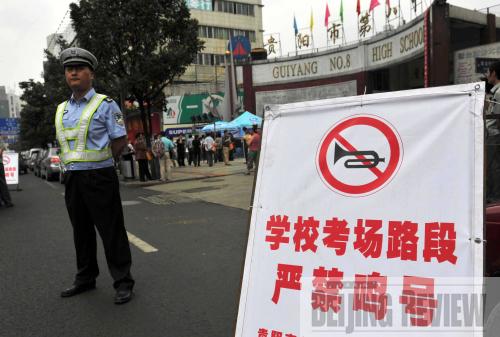|
 |
|
GREAT BUT TEMPORARY: It's a pity that strict noise controls are only oriented to national college entrance examination takers over limited days (YANG YING) |
Temporary Peace of Mind
During this year's national college entrance examination (June 7-8), government officials in Zhengzhou, capital of central China's Henan Province, were dispatched to patrol city streets. Their major task was to temporarily stop work on noisy construction projects near test venues and ensure urban noises were kept to a minimum.
For years, every city has worked out measures to make life more convenient for national college entrance examination takers during test days. Meanwhile, those who live near test venues can also enjoy a quiet environment.
However, people can't help wondering, if not for the college entrance examination, would officials still pay close attention to noise pollution?
It's important to provide examinees with a good environment, but of the same importance is also the right of ordinary urban residents who are entitled to a noise-free living environment. The annual college entrance examination only lasts two days, but city dwellers live with noise all year round. If the government has realized that noise pollution is harmful to the examinees, they should also know that noise pollution is harmful to every urban resident.
The Beijing News
A Load of Rubbish
Since mid-May, trash collectors in Nanyang City, Henan Province, have begun to block entrances to many city shops with garbage. This is because shopkeepers are refusing to pay garbage disposal fees that they say are excessively high.
Why is garbage allowed to pile up? Some local officials are said to direct the blockade. In Nanyang, garbage disposal fees are collected by grassroots officials. Those who fail to collect the fees in full will have to make up the shortfall with their own money. If they collect more than required, they are allowed to keep the surplus. As a result, officials become unbelievably enthusiastic about these fees. In order to make big profits for themselves, they even resort to unscrupulous methods to pick up as many garbage disposal payments as possible.
The local government is wrong to deal with fee collection using a profit-driven scheme. Officials are supposed to focus more on services, instead of profits. It's unwise to encourage them to make money from public service programs.
A responsible government should handle the public's complaints in a rational way. The compelling way to deal with the garbage fee controversy in Nanyang can only damage the government's image.
China Youth Daily
Bus Rides Heat Up
After a recent bus fire in Chengdu, southwest China's Sichuan Province, Shenyang in northeast China decided to suspend the service of air-conditioned buses with sealed windows in the city. Local people will have to endure stifling conditions while commuting for the rest of the year and into the foreseeable future.
It's because the fire occurred on an air-conditioned bus in Chengdu that this regulation has come about. But what if the fire had flared up on a bus without air conditioning? Would the city cancel all bus services?
While bus operators in other cities are trying to learn lessons from the Chengdu accident and improve bus passenger safety, Shenyang has taken an easy option.
Ensuring the public's safety is not easy. Any negligence might lead to serious consequences. However, one thing is certain, if bus operators in other cities all follow Shenyang's example, local residents will be thrown into more disarray as a result of government's lazy approach to problem solving.
Qianjiang Evening News
Developers at It Again?
While the whole world, including China, is engulfed by the severe economic recession triggered by bad mortgage debts, China's property market seems to be bucking this trend, with developers taking every possible means to drive up housing prices, regardless of potential risks of doing so.
Because of reviving market demand, relaxed credit controls and the inflow of speculative investment, China's housing market is rebounding to some extent. Under this circumstance, developers will be shortsighted to shore up prices again.
In order to curb investment bubbles, the Chinese Government is said to be considering levying a property tax. After all, a stable property market is very important for China in the shadow of a financial crisis.
In the market economy, prices of any commodity depend on the macroeconomic situation as well as supply and demand. By the end of 2009, the total floor space of unsold homes is expected to top 300 million square meters, a huge stockpile that will take a long time to sell out. In 2008, the housing-price-to-income ratio in China was 6.78, largely higher than the world's average level, which means the country's housing market is still full of bubbles.
If property developers keep driving up housing prices irrationally, not only will they slip into a dilemma but the national economy will be dragged down with them.
Guangzhou Daily | 